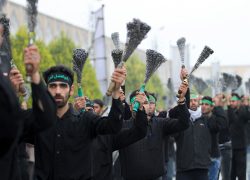The Isfahan weekly cultural and social magazine began in 2005 under the ownership of the then-mayor of Esfahan. In 2006, it obtained a license to transition into a newspaper, adopting the name Esfahan-e-Ziba. The first issue of Esfahan-e-Ziba was published on the birth anniversary of Prophet Muhammad (PBUH).
Over the past two decades, Esfahan-e-Ziba has faced many challenges but has steadily grown. The newspaper’s evolution can be divided into three main phases:
- The first phase marked its establishment, during which the first generation of talented journalists was nurtured. During this period, Esfahan-e-Ziba established itself as a professional media outlet, covering a wide range of news and analysis.
- The second phase unfolded in the mid-2010s, when the newspaper expanded its activities, launching supplements and special editions. Notable among these are Gardeshgar-e-Mosbat magazine, Bisimehchi special issue, Timcheh quarterly, Fasl-e-No monthly journal, and Ravayat-e-Esfahan
- In the third phase, Esfahan-e-Ziba built on its previous achievements while embracing the shift to digital media in Iran. Today, it has expanded its online presence, becoming a key player in raising awareness of Esfahan’s issues and amplifying the voices of its residents in the digital space.
In 2023, Esfahan-e-Ziba scored an impressive 92.2, earning the title of the best newspaper in Esfahan province and the top regional newspaper in all of Iran. This solidified its position as a leader in local journalism.
Code of Ethics for Esfahan-e-Ziba Newspaper
Every organization needs a set of guidelines and a code of ethics to define its core values and scope of work. With this in mind, Esfahan-e-Ziba has established a code of ethics that governs its staff. The fundamental principles are as follows:
- Our content will always prioritize the national interest, the well-being of the Islamic Republic, and public trust. Esfahan-e-Ziba is deeply committed to ensuring that the content aligns with national security and broader Islamic values. We respect our readers’ trust and protect individuals’ privacy and dignity. The newspaper avoids stirring religious, ethnic, or tribal tensions and always acts in the national and local interest.
- As a public-sector media outlet, Esfahan-e-Ziba does not serve the interests of any political party or group and refrains from endorsing any candidate during elections. We also do not accept advertisements from candidates or political groups, even during elections. Additionally, we avoid publishing content that serves our staff’s personal interests. Esfahan-e-Ziba values all opinions and beliefs within the framework of the Islamic Republic without favoring any particular ideology.
- As a local newspaper, our priority is to address issues concerning Isfahan. We cover national issues only when absolutely necessary.
- Fair criticism is not just a duty, but a commitment for societal improvement. It is our duty to critically analyze cultural, political, social, and economic issues, both locally and nationally. No organization, public or private, is exempt from this scrutiny. However, our critiques are made within the framework of the Islamic Republic, not from an opposition stance. We do not flatter or prejudge, nor are we obligated to consider any institution’s political or operational considerations. Content will only be published under pressure when required by law and communicated through legal channels. No person or organization will be excluded from our coverage. If any entity prevents us from reporting, we will inform our audience.
- Esfahan-e-Ziba acts as a vigilant city watchdog, monitoring officials, citizens, and urban activities. While we take a critical stance, we also highlight the positive aspects and beauty of the city, society, and organizations. Alongside critiques, we offer suggestions for improvement.
- We always include their response when reporting on accusations involving individuals or organizations. If the accused party does not respond, we will clarify that in the report. The newspaper commits to publishing responses from those involved, and if errors are found, we will correct them and apologize if necessary.
- When gathering information, journalists working for Esfahan-e-Ziba must clearly identify themselves and the media outlet. They are expected to collect news openly and transparently. No interviews or conversations will be recorded secretly without the interviewee’s explicit consent. They may do so if the interviewee wishes to review their interview before publication. However, if significant changes are made, Esfahan-e-Ziba reserves the right not to publish the interview. The headline and introduction remain under the newspaper’s control, particularly for exclusive interviews.
- If a source requests anonymity, Esfahan-e-Ziba will respect this request. Similarly, if a source provides the information they do not want to publish, we will honor that. The identities of news sources will only be revealed if required by law.
- Journalists must use their influence and the newspaper’s credibility solely for gathering news and information. They must avoid using confidential information for personal gain.
- Staff must align with the newspaper’s overall policies and should not publish content elsewhere that contradicts those policies. A journalist’s name is their signature, and publishing contradictory content is unprofessional. Additionally, journalists are prohibited from working with organizations connected to their coverage area, ensuring transparency and unbiased reporting.
- Journalists must avoid accepting any gifts that could create unreasonable expectations or influence their coverage. Any such incidents must be reported to management.
- All staff at Esfahan-e-Ziba are responsible for signing only the work they have personally created.






